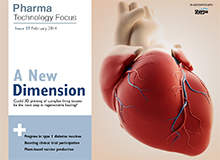
Bioprinting, or the 3D printing of complex living tissues, is opening up a new frontier in regenerative medicine. With 3D printing already firmly established in the medical world, we take a look at recent breakthroughs and the future potential of the technology.

Discover B2B Marketing That Performs
Combine business intelligence and editorial excellence to reach engaged professionals across 36 leading media platforms.
We also look at two recent studies that indentify the enterovirus types associated with type 1 diabetes, opening new doors for vaccine development, and find out more about Blue Angel, the US military’s project for alternative plant-based vaccine production. Moreover, we IBM about a new open-source modelling application that could help combat global outbreaks of dengue fever and malaria in real time, ask biotechnology specialist PathXL why its software for tumour tissue analysis could mean a leap forward in molecular cancer pathology, and find out how research organisations are working to boost clinical trial participation rates.
In this issue
Access for All
As recruiting patients for clinical trials becomes a growing challenge, Chris Lo asks how research organisations are finding better ways of reaching out to prospective candidates.
Click here to read more.
Closing In on Diabetes
Two recent studies identify the enterovirus types associated with type 1 diabetes, opening up new paths for vaccine development. Dr Nicola Davies investigates how close we are to a viable solution.
Click here to read more.

US Tariffs are shifting - will you react or anticipate?
Don’t let policy changes catch you off guard. Stay proactive with real-time data and expert analysis.
By GlobalDataPredict and Control
Elly Earls asks IBM’s James Kaufman and UCSF’s Simone Bianco how a new open-source modelling application could help combat global outbreaks of dengue fever and malaria in real time.
Click here to read more.
Regenerative Revolution
Could the 3D printing of complex living tissues be the next step in regenerative healing? Chris Lo investigates.
Click here to read more.
Plan of Action
The US military has been working on alternative plant-based vaccine production methods to boost vaccine availability in the case of a global pandemic. Chris Lo finds out more about the research.
Click here to read more.
Tackling Tissue
Biotechnology specialist PathXL has developed software for swift and accurate tumour tissue analysis. Dr Nicola Davies asks why the technology represents a leap forward in molecular cancer pathology.
Click here to read more.
Click to Cure
The future of cancer research lies not only in the lab but at the fingertips of the masses. Elly Earls find out how citizen science could help cure cancer faster than we ever imagined.
Click here to read more.
Next issue
Completely open access to clinical trial data has been a contentious issue for some time. But could this be set to change? We examine new pledges from Sanofi, GSK and Pfizer to open up data under the new EFPIA/PhrMA guidelines.
We also take a look at FIT Biotech’s HIV vaccine trial which has attracted significant interest due to its scale and investigate what has happened in the five years since the influenza A strain was officially announced as a pandemic and whether we are now better prepared for such a scenario.
Moreover, we explore new a microneedle array that could soon be used for pain-free vaccine shots and checking of blood sugar levels, and take a look at Cancer Research UK’s new mobile phone game which is designed so players unravel gene data, helping with low-level research.
Digital magazine FAQ
Pharma Technology Focus is available on the iPad and as a free desktop version*. You can download our app or read the latest issue here.
View the archive of back issues.
Sign up for your subscription here.
*Browser compatibility: The desktop version can be viewed in the latest two version of Chrome, Firefox and Safari, as well as in Internet Explorer 9 and 10. Some features may not be compatible with older browser versions.





